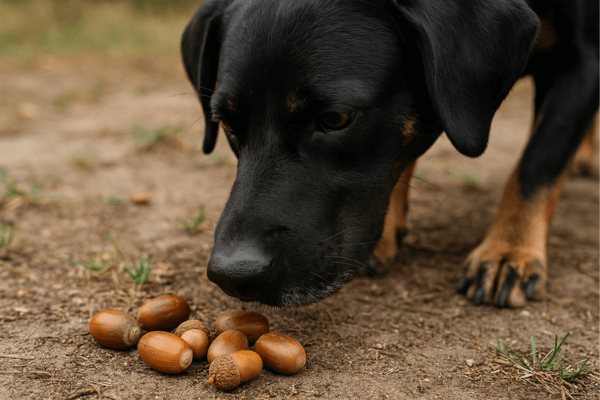Familiar scene: you’re walking your dog through the park when suddenly they gobble up an acorn as if it’s a delicacy. However, acorns are far from harmless – they can be life-threatening for our four-legged friends.
Why acorns are dangerous for dogs
The problem lies in the tannins that acorns contain. These compounds bind to proteins and iron in your dog’s body, potentially causing serious damage to blood vessels, intestines and kidneys. And no, it doesn’t matter if it’s just one acorn – even small amounts can cause problems.
Beyond chemical poisoning, acorns also pose a mechanical risk. Their sharp edges can damage the gastrointestinal tract, while their size can cause blockages. Unripe acorns and oak leaves are particularly dangerous as they contain higher concentrations of tannins.
From experience, I can tell you that owners often underestimate how quickly this can go wrong. While some other foods like mandarins are relatively safe in small quantities, this absolutely doesn’t apply to acorns.
Symptoms to watch for
The first signs of acorn poisoning typically involve gastrointestinal issues. Your dog may vomit, develop diarrhoea (sometimes bloody) and become lethargic. These symptoms can appear within hours of consuming acorns.
In more severe cases of poisoning, you’ll notice signs of kidney failure: dark urine, reduced urination, and sometimes neurological symptoms such as stiff movement or paralysis. These are warning signs that require immediate action.
What to do if your dog has eaten acorns
Contact your vet immediately – even if your dog appears normal. With acorn poisoning, prompt treatment with IV fluids and medication can be lifesaving. This isn’t a situation where you should “wait and see.”
Don’t attempt to induce vomiting without professional advice. This can sometimes cause more harm, especially if the acorns have already reached the intestines or if there’s damage to the oesophagus.
Prevention is better than cure
The best approach is naturally to prevent your dog from eating acorns in the first place. Regularly check your garden and walking areas, especially in autumn when acorns fall en masse. I know this can feel like a Sisyphean task, but it’s worth the effort.
Train your dog to respond to “drop it” or “leave it” commands by exchanging the item for a tasty reward. Use high-quality treats to create distractions during walks under oak trees. And an important tip: avoid corrections or punishment – this might cause your dog to swallow acorns out of stress.
Why some dogs obsessively eat acorns
Some dogs develop a real fixation on acorns. This could indicate underlying stress, boredom or even medical issues. If your dog constantly searches for acorns, it’s wise to discuss this with your vet.
Common misconceptions
A frequent misconception is that acorns are “natural” food and therefore must be okay. Pigs can indeed safely eat acorns, but dogs have a completely different digestive system. Horses and sheep are also susceptible to tannin poisoning.
Another mistake I often see: owners thinking small dogs are at less risk because they can’t eat much. The opposite is true – smaller dogs are actually more vulnerable because relatively speaking, a smaller amount can cause damage.
Acorns are no joke for dogs. As a dog food specialist, I can assure you there are plenty of other, safe ways to treat your dog. Make sure you stay alert during acorn season and don’t hesitate to seek professional help if things go wrong.


